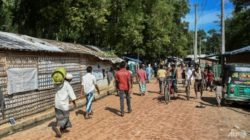DHAKA – On Wednesday, Bangladeshi authorities announced their refusal to accept additional Rohingya refugees fleeing Myanmar, stating that the country is already struggling to support over 1.2 million refugees. The Rohingya have sought refuge in Bangladesh for decades, escaping persecution in Myanmar, particularly during the military crackdown in 2017.
Bangladesh, classified as a developing country, spends an estimated $1.2 billion annually to provide support for the Rohingya refugees, but international aid for this stateless minority has decreased since 2020. The majority of Rohingya refugees reside in overcrowded and unsanitary camps in Cox’s Bazar district, situated in eastern Bangladesh.
Mizanur Rahman, Bangladesh’s refugee relief and repatriation commissioner in Cox’s Bazar, expressed concerns, stating, “We are already overburdened with more than 1 million Rohingya. The people of Bangladesh certainly will not welcome any more Rohingya here. Hospitality in the host community has turned into hostility. In this context, there is nothing much we can do for the newly displaced Rohingya from Myanmar.”
Other Bangladeshi officials, including Road Transport and Bridges Minister Obaidul Quader, have echoed this sentiment, affirming that Bangladesh will not permit additional Rohingya to enter the country.
Recent weeks have seen hundreds of people, including Rohingya, gathering at various points along the Bangladesh-Myanmar border seeking shelter amidst the junta’s resistance offensive. Some Myanmarese border troops and police, many with bullet wounds, have also sought refuge in Bangladesh during intense fighting in early February.
Rahman highlighted the challenges, stating, “It can’t be said that the overall law and order situation is very good at the moment as almost every day there are incidents of murders… moreover, there have been new added tensions due to the unrest in the border areas.”
The Rohingya, described by the UN as “one of the world’s most persecuted minorities,” have faced decades of discrimination and repression in Myanmar, where they are not recognized as an indigenous ethnic group and are denied the right to claim citizenship. Tragically, in 2023, thousands of Rohingya refugees embarked on perilous sea journeys from Bangladesh and Myanmar, resulting in the highest number of deaths or disappearances in nine years, with 569 reported cases last year.





